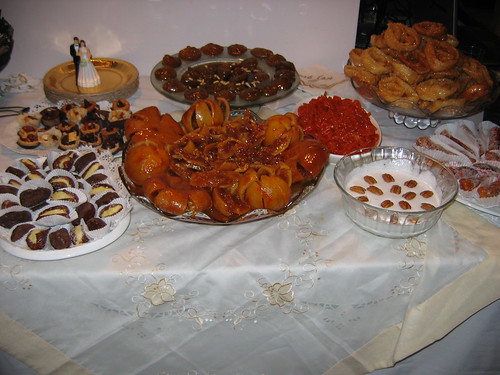Tirbahu wa Tisadu - Happy Mimuna!
Happy Mimuna to all of SmellyBlog readers who celebrate it. I haven’t celeberated it for years, but was fortunate enough to be invited last night to the celebration with friends.
Mimuna is the celebration of Spring and what used to be the original Jewish New Year (now celebrated in the fall, in the 7th month of Tishrei). The month of Nissan (which is now) is considered the first month according to the Jewish calendar.
North African Jews celebrate the Mimuna commencing on the evening of the last day of Passover. As soon as the stars appear and it’s ok to eat leavened bread, the children were sent to bring fresh flour from the nearest grocery store that happened to open especially for that purpose, and the women would prepare “Muflettas” – a soft flat bread, fried in a pan and served with butter and honey. This would be the first bread that is not Matzah that they would eat after the Passover. It symbolizes sweetness, happiness and prosperity.
In the night of the Mimuna (which was yesterday night in the time zone of my lap top and two nights ago where I am now), the people (men and children) would walk from house to house and be greeted by the hospitality of the women in each house (who remained there to welcome the guests an serve them fresh Muflettas). The entire evening is spent with music, dancing, and sweet hospitatly. The following day, the people would go out to the nature to celebrate spring with more music and dancing and outdoor feasts (which now have evolved in Israel into intense Bar BQ in every available spot outdoor and have adopted also by Israelis who are not of North African descendent…). It's improtant to note though, that different communities celebrated the Mimuna differently (the Jews from different towns in Morocco had different customs, and the Jews living in the countryside had other customs as well).
The foods served on the eve of the Mimuna are all sweet. The women would prepare sweets such as candied citrus peels, nuts and dried-fruit specialties and their legendary hand made marzipans for the event during the week of Passover; these all require no flour, and therefore can be prepared in advance without compromising the holiness of Passover. Green foods are also served to symbolize life and its new awakening in the spring, and in particular – spearmint (Na’na) tea and fresh fava (“Full”) beans, which are in season at this time of year. Alcoholic beverages are also served in tiny cups, and in particular Araq, the anise flavoured liquor.
The customary greeting or blessing during the Mimouna is “Tribahu wa Tisadu”, which invites the people to join the feast and blesses them with abundance and riches (I could not find an exact meaning to the word “tirbahu”, so I am half guessing here. The meaning of the name, Mimuna, is said to be originated in either the word "Mamon", meaning riches, or the word Emuna, meaning faith. It could have also originated in the name of Maimonides (an infamous Rabi and Jewish-religious leader, physician and philosopher from the medieval times who moved to North Africa after the Jews of Spain were deported), though this is a very new idea to me that I only found in one place.
So we’ll conclude with this and wish you all a Happy New Year and a merry spring full of abundance and riches – both spiritual and physical:
Tirbahu wa Tisadu!
Labels: Announcements, Mimuna




1 Comments:
What a wonderful post!!!
Belated Tribahu wa Tisadu to you, Ayala.
I loved learning about this celebration of the very old people of Israel. It is so fascinating to me to learn of surviving manifestations of ancient traditions.
And I do love Araq! Have one youself in the health of us, your readers, dear. Have a lovely time!
Post a Comment
<< Home